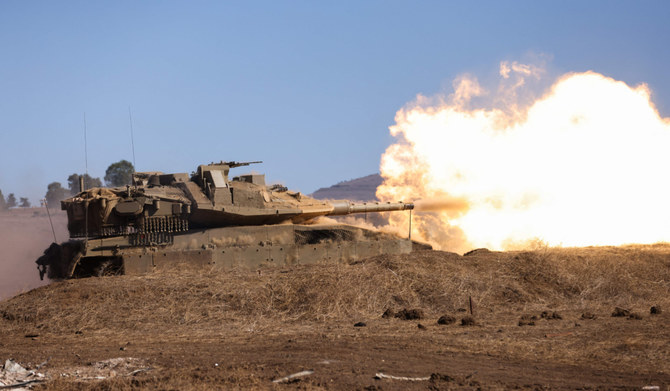
- ARAB NEWS
- 05 Jul 2025

BEIRUT: Hostilities on the southern Lebanese front escalated on Friday, as Israeli shelling for the first time reached the Mays Al-Jabal Governmental Hospital, damaging it and injuring a doctor.
Imran Riza, the UN’s humanitarian coordinator for Lebanon, called on “all parties to adhere to international humanitarian law throughout their military operations strictly, and to protect civilians, including humanitarian and medical workers, wherever they are.”
Pleading for all civilian sites, including homes, farms and hospitals, to be protected, he urged all sides to “exercise restraint and avoid further escalation” and said further suffering among the civilian population must be avoided.
The missile that hit the hospital did not explode but it caused damage to the emergency department and injured a doctor there, the hospital’s director, Dr. Hussein Yassin, said.
The Lebanese Ministry of Public Health condemned the attack, describing it as “flagrant defiance of all the international laws and treaties.” It said it holds “Israeli authorities fully responsible for this unjustifiable act, which would have led to catastrophic results had the artillery shell targeting the hospital exploded,” and called for “a thorough and fair investigation to hold those behind these crimes accountable.”
Elsewhere, Israeli warplanes were seen flying over Beirut. Meanwhile, a military source denied reports that the Lebanese army had cleared its position in the Bir Shuaib area close to the village of Blida near the southeastern border. The source said the army does not have an outpost in that region, only a mobile security point “where soldiers remain.”
Clashes between Hezbollah and the Israeli army on the southern Lebanese front have significantly escalated but remain limited to the area south of the Litani River.
Riza warned that there have been signs of rising tensions, marked by increased hostilities along the Blue Line, the demarcation line between Lebanon and Israel that was set by the UN in 2000 to help determine whether Israeli forces had fully withdrawn from the country.
“We have recently witnessed alarming attacks killing and injuring civilians in south Lebanon, including women, children and media personnel,” he said.
“Significant damage has also been inflicted upon private property, public infrastructure and agricultural land, forcing over 25,000 people to be displaced. Local farmers risk their lives to harvest olives and tobacco, crucial for sustaining their livelihoods and income.”
Hezbollah on Friday mourned seven of its members, who were killed in clashed with the Israeli army. It brings the total number of the party’s fighters killed since the current fighting began to 69.
The Israeli army said its aircraft had bombed Hezbollah infrastructure in Lebanon in response to the firing of guided missiles from Lebanese territory. The attacks “targeted Hezbollah compounds, observation points and technological equipment,” it added.
Hezbollah said it had targeted “a gathering of enemy soldiers near Al-Asi site, opposite the Lebanese border town of Mays Al-Jabal, with guided missiles, causing direct hits.”
There have been reports that the Israeli army continues to use phosphorus shells, the firing of which in civilian areas is banned under international humanitarian law, in its operations.
On Thursday night, towns in Marjayoun District were subjected to intense attacks, in which phosphorus bombs and heavy shells were reportedly used, resulting in damage to homes in Bwayda that were evacuated when the conflict began.
The municipal stadium in the city of Sidon, which is hosting many displaced people from border areas, was the scene of a massive gathering for Friday prayers, during which worshippers prayed for the souls of those buried under the rubble in the Gaza Strip, and donations were collected.
Israeli Defense Minister Yoav Gallant on Thursday renewed his threats to Hezbollah, warning the party’s secretary-general, Hassan Nasrallah, that if he “makes a mistake, Hezbollah and Lebanon will bear the consequences.”
Nasrallah is due on Saturday to deliver a second speech about the conflict, following his first public address a week ago. One political observer said it was expected it to be “an escalatory speech but not to the extent of widening the conflict.”
Nasrallah’s address will coincide with an emergency Arab summit in Riyadh to discuss the latest developments in the Gaza Strip.